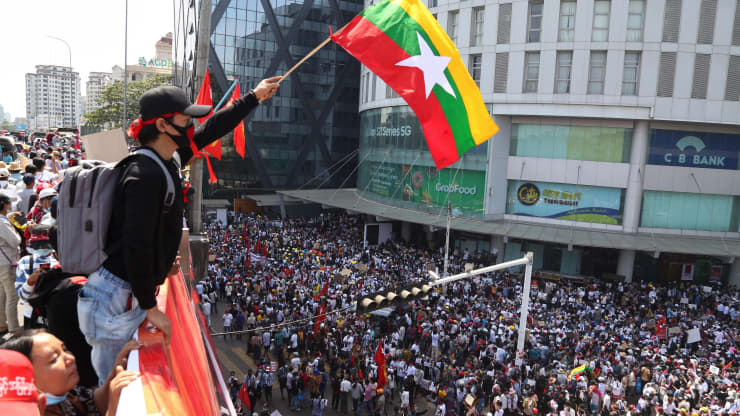
Myanmar's anti-coup protesters returned to the streets in force on Wednesday, staging the biggest demonstrations since troops fanned out around the country to quell opposition to the new military junta.
Much of the country has been in open revolt since the army deposed Nobel laureate Aung San Suu Kyi's government at the start of the month and charged her under an obscure import law.
Tens of thousands rallied in Yangon, some blockading roads with vehicles to stop security forces from moving around the nation's biggest city.
Police and soldiers were spotted near a key protest junction but appeared to be hanging back, looking on as demonstrators streamed past.
"We have to fight until the end," Nilar, a 21-year-old student who asked not to use her real name, told AFP.
"We need to show our unity and strength to end military rule. People need to come out on the streets."
Wednesday's crowds came in defiance of violent efforts by the regime to bring resistance to heel -- including use of tear gas and rubber bullets -- following nationwide street protests and a disobedience campaign encouraging civil servants to strike.
Demonstrations over the past two days had been noticeably smaller since troops were deployed around Yangon at the weekend.
But social media platforms had been flooded with calls for a show of force by protesters in the hours before the junta imposed a third consecutive overnight internet blackout.
By noon, there were anti-coup demonstrations across Myanmar, from the remote highland region of Chin state to a small town in the Irrawaddy delta where parading protesters hoisted Suu Kyi posters.
Right outside the administrative capital Naypyidaw, tens of thousands of people from different sectors -- including engineers, doctors and teachers -- marched through the logging town of Pyinmana carrying signs saying "Help Myanmar".
UN special rapporteur Tom Andrews warned that soldiers going into Yangon, as had been reported, could lead to the situation there spiralling out of control.
"We could be on the precipice of the military committing even greater crimes against the people of Myanmar," he said.
One young woman remained in a critical condition in Naypyidaw after being shot in the head last week.
Scores of well-wishers gathered Wednesday at the site where she was shot to hold a prayer session, carrying posters of her.
The military said a police officer had died in Mandalay after a confrontation with protesters on Sunday, adding in a statement: "Those who committed lawless action on the police officer will be dealt with as necessary."
New charge for Aung San Suu Kyi
The military justified its power seizure by alleging widespread voter fraud in November elections won by Suu Kyi's party in a landslide.
After her detention in a dawn raid on February 1, Suu Kyi was charged with possessing unregistered walkie-talkies found in her home.
Her lawyer Khin Maung Zaw told AFP on Tuesday that Suu Kyi was also charged with violating the country's disaster management law. Further details of that charge have not been made public.
The disaster management law has also been used against deposed president Win Myint for an election campaign event that the junta claims broke coronavirus restrictions.
Her lawyer added that Suu Kyi and Win Myint, both of whom he has yet to have any contact with, were expected to appear via video link during a March 1 trial.
In a further sign of the military's efforts to stifle the protest movement, state broadcaster MRTV said arrest warrants had been issued for several popular actors, directors and a singer.
They are accused of using their "popularity and fame" to encourage people to join the civil disobedience movement against the junta, MRTV said.
'Not what China wants to see'
More than 450 people have been arrested since the coup, according to the Assistance Association for Political Prisoners monitoring group.
Western powers and the United Nations have repeatedly condemned the leaders of Myanmar's new military administration, which insists it took power lawfully.
China had initially not criticised the coup, which Chinese state media described as a "cabinet reshuffle".
However, Beijing's ambassador to Myanmar said Tuesday that the current situation in the country was "absolutely not what China wants to see".

